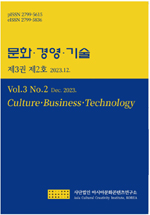주민 중심 지역문화축제와 주체성 변천과정 연구
A Study of Local Community Cultural Festivals and the History of Subjectivity : Focusing on the Case of Ulsan Citizen's Representative Festival
- 아시아문화콘텐츠연구소
- 문화·경영·기술
- 제3권 제2호
-
2023.127 - 24 (18 pages)
-
DOI : 10.54385/cbt.2023.3.2.7
- 313

2014년 한국정부와 의회는 지역문화진흥법을 제정하며 지역문화에 관한 기존 문화·예술의 단편적 법령들을 넘어 보다 체계적 추진을 위한 법령을 만들었다. 지역별 주민이 자발적인 문화 활동을 통해 스스로 문화향유권을 신장하여, 지역의 현대적 공동체 형성은 물론 이 과정에서 만들어지는 지역문화를 자원으로 삼아 지역경쟁력이라는 부가가치 발생까지 꾀하고자 하였다. 이렇듯 지역주민의 자발적이며 독창적인 지역문화를 기반으로 하는 법정문화도시 정책까지 도입되었으나, 현재에도 문화를 개인별 여가나 복지 또는 예술이나 산업의 관점으로 관광·체험상품과 같은 경제가치 창출 도구로서 문화정책 및 사업을 시도하는 움직임이 역력하다. 어느 쪽이든 행정이나 생산자·공급자만의 관점으로 주민은 소극적·피동적 대상이라 전제하여 이루어지고 있는데, 이는 지역문화가 지역 구성원이 스스로 형성·공유하는 삶의 양식이라는 기본을 놓치면서 결국 문화도시(화)를 주장하나 이에 역행하는 상태로 변질하고 있다. 지역문화진흥법은 물론 지방자치, 주민자치 본연의 목적 달성은커녕, 일방적이고 무리한 개입으로 인해 자연스럽게 형성될 수도 있었을 가능성까지 해치는 악영향으로 왜곡되는 것이다. 본 연구에서는 도시 공동체 단위에서 주민이 스스로 지역문화의 주체로서 지역의 고유 문화자원을 발굴하고 매개자로서 지역사회에 공유해나가는 과정 속의 지역문화콘텐츠, 그 가운데에서도 가장 흔히 접할 수 있는 지역축제를 사례로 분석해보고자 한다. 현재 대부분의 축제는 지자체나 이를 대행하는 전문가 또는 대행사 등 소수를 중심으로 기획해 주민을 이에 동원하는 방식으로 운영되는데, 본 연구에서는 이런 현상과 반대로 비교적 최근까지 공동체의 잔치로서 주민이 축제를 직접 만들어갔던 울산 주민 대표축제의 변천사를 다뤄보고자 한다. 현대에 새로 형성된 지역 '울산'이자 또 이 지역주민이 직접 꾸린 축제가 어떻게 이전의 전통적 축제와 같은 맥락에서 지역의 화합과 고유의 가치 창출이 가능했는지 조명해볼 것이다.
In 2014, the Korean government and parliament enacted the Local Culture Promotion Act, creating a law to systematically promote local culture beyond the existing piecemeal laws on culture and arts. The purpose of the Act is to enhance the cultural enjoyment rights of local residents through voluntary cultural activities, thereby forming a modern community and creating added value for local competitiveness by using local culture as a resource. Even statutory cultural city policies based on the voluntary and original local culture of local residents have been introduced, but even now, there is a strong movement to try cultural policies and projects as economic value creation tools such as tourism and experience products from the perspective of individual leisure and welfare or art and industry. Either way, it is based on the premise that residents are passive and passive objects from the perspective of the administration or producers and suppliers, which misses the basic point that local culture is a way of life formed and shared by local members, and eventually turns into a state that claims to be a cultural city but goes against it. Not only does it not fulfill the purpose of the Local Culture Promotion Act and local self-governance, but it is also distorted into an adverse effect that harms the possibility that it could have been formed naturally due to unilateral and unreasonable intervention. In this study, we will analyze local cultural contents in the process of discovering and sharing local unique cultural resources with the community as a mediator as the main actors of local culture at the urban community level, and local festivals, which are the most commonly encountered, as a case study. Currently, most festivals are organized by a few people, such as the local government or an expert or agency working on their behalf, to mobilize residents to participate in the festival. In contrast to this phenomenon, this study examines the evolution of the Ulsan Residents' Representative Festival, which, until relatively recently, was organized by the residents themselves as a community feast. This study will shed light on how the festival, which was organized by the residents of Ulsan, a newly formed region in the modern era, was able to create regional harmony and unique values in the same context as the previous traditional festivals. This study examines the 57-year evolution of the newly created Ulsan Residents' Representative Festival in the modern era and the changes in the position of residents by system in relation to the management of the festival. By examining how residents have created a relationship with the new area, we hope to draw out what the changes in residents' identity and agency mean for Korean society and the festival today. A community and organization starts with one person, and the character of a community depends on what kind of people it consists of, so as part of communication and integration, we need to think together about how local festivals should be created and why and how residents should be reintroduced as subjects. This is because local cultural contents are rooted in local culture, and this uniqueness is accumulated and shared over time by voluntary actors.
1. 머리말
2. 이론적 논의
3. 맺음말
(0)
(0)